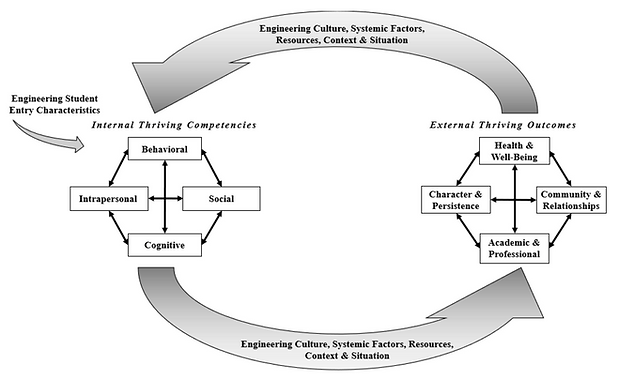Julianna Gesun, Ph.D.
Research

What if engineering could be known for thriving?
My overarching research goal is to shift the narrative in engineering from “surviving” to “thriving” to improve the ways we attract, support, retain, and graduate engineering students. As a former engineering student, I wanted more from my engineering education experience than to just “survive” and suffer less. The reduction of suffering does not, by itself, lead to thriving. I use quantitative and qualitative approaches to understand how and why some students thrive while others barely survive in the current engineering culture to understand the factors and processes that support a thriving engineering ecosystem.
My research represents the first comprehensive investigation of thriving for undergraduate engineering students, including cognitive, interpersonal, intrapersonal, academic, environmental, and socio-cultural dimensions.
Research Interests
-
Engineering Thriving: the process by which engineering programs facilitate the environments for students todevelop optimal functioning in undergraduate engineering programs
-
Non-cognitive factors (such as ethics, gratitude, and wellbeing) that support engineering student success
-
Diverse, inclusive, and equitable engineering education
1
Gesun, J., Pitman-Gammon, R., Berger, E. J., Froiland, J. M., & Godwin, A. (2021). Developing a Consensus Model of Engineering Thriving Using a Delphi Process. International Journal of Engineering Education, 37(4). https://www.ijee.ie/1atestissues/Vol37-4/08_ijee4079.pdf
Model of engineering thriving based on consensus from experts.
2
Gesun, J., Major, J., Berger, E. J., Godwin, A., Jensen, K., Chen, J., Froiland, J. M. (2021). A Scoping Literature Review of Engineering Thriving to Redefine Student Success. Studies in Engineering Education, 2(2), 19–41. http://doi.org/10.21061/see.9
This chart compares how various success factors are measured versus defined in the literature. Interestingly, 24.5% of papers in this literature review defined and measured success differently.
Selected Publications
Advising
Students I supervised and funded
Not Pictured
Vasiliki Partinoudi, PhD candidate in Education
Graduated April 2022








